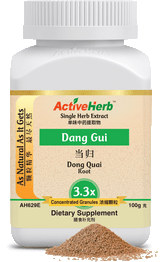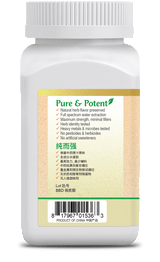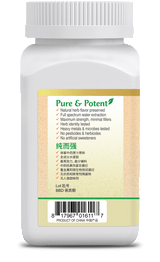Herbal Information on Dong Gui in Concentrated Powder Form
Dang Gui, also known as Chinese Angelica or Radix Angelicae Sinensis, is a popular herb in traditional Chinese medicine (TCM). It is derived from the root of the Angelica sinensis plant, which is native to China. Dang Gui has been used for centuries in TCM to address various health concerns and promote overall well-being.
Key characteristics and uses of Dang Gui include:
-
Blood tonic: Dang Gui is widely known for its ability to nourish and invigorate the blood. It is often used to address conditions related to blood deficiency, such as anemia, menstrual irregularities, and postpartum recovery.
-
Regulating menstruation: In TCM, Dang Gui is commonly prescribed to regulate menstrual cycles, alleviate menstrual cramps, and support overall reproductive health. It is often included in herbal formulas for women's health.
-
Supporting digestion: Dang Gui is believed to have mild warming properties that can help promote healthy digestion and relieve gastrointestinal discomfort, such as bloating and abdominal pain.
-
Immune support: Some traditional uses of Dang Gui suggest that it may have immune-strengthening properties, helping the body defend against infections and promote resilience.
-
Harmonizing effects: Dang Gui is often included in herbal formulations to balance the effects of other herbs and promote harmony within the body's systems.
Using Dang Gui concentrated powder involves a similar process to using other powdered herbal supplements. Here's a general guide on how to use Dang Gui concentrated powder:
-
Dosage: Follow the dosage instructions provided by your healthcare provider or the manufacturer. The appropriate dosage can vary depending on factors such as age, health status, and the specific condition being treated.
-
Measurement: Measure the recommended dosage of Dang Gui concentrated powder using a measuring spoon or the provided scoop. The dosage may be specified in grams or teaspoons.
-
Administration: Dang Gui concentrated powder can be taken in various ways, including:
-
Mixing with water: Add the measured dose of Dang Gui powder to a glass or cup. Pour in a small amount of warm water and stir until the powder is fully dissolved. Then, add more water to dilute the mixture as desired. Drink the solution while it's still fresh.
-
Combining with other liquids: You can mix Dang Gui powder with juice, herbal tea, or a smoothie to mask the taste if desired.
-
Capsule form: Some Dang Gui concentrated powders may come in capsule form, which can be swallowed with water like other supplements.
-
-
Timing: Take Dang Gui concentrated powder as directed by your healthcare provider. Some supplements may be recommended to take with meals, while others may be best taken on an empty stomach. Follow the specific instructions provided.
-
Consistency: For best results, take Dang Gui concentrated powder consistently as recommended. It may take time for the effects of herbal supplements to be noticeable, so be patient and stick to the recommended dosage and schedule.
-
Storage: Store Dang Gui concentrated powder in a cool, dry place away from direct sunlight. Follow the storage instructions provided by the manufacturer to maintain its potency and freshness.
Common Name: Chinese angelica root
Botanical Name: Angelica Sinensis root
Channels: Heart, Liver, Spleen
Other Names: Dong Quai, Tang Kwai, Radix Angelicae sinensis
Pin Yin Name: Dang Gui
Package Size: 100 grams (3.5 oz.)
Dosage: Take 2 g each time, 1 to 2 times per day, or as instructed by a herbal practitioner. Dissolve in hot water or mix into yogurt.
Origin: China
Brand: ActiveHerb
Cautions: Do not use if pregnant or nursing.
Naturally Occurring Chemical Components: Sucrose, Fructose, Glucose, Vitamin A, Vitamin B12, Vitamin E, 17 kinds of amino acids, Sodium, Potassium, Calcium, Magnesium, β-Bisabolene, Isoacroraene, Acoradiene, Chamigrene
Product Properties: Sweet, Acrid, Bitter, Warm
Check out our How to Use Bulk Herbs page to see how to use herbs correctly. Our web page is constantly expanding, as of today we have articles on:
- How to make salves, poultice, tinctures, teas, capsules, gargles, and foot bathes
- How to make a citrus facial splash
- Cayenne pepper: Caterpillar and aphid spray ( Natural insect repellent )
- Citrus potpourri basket
Traditional Chinese Herbs
Chinese Traditional herbs should be regarded as an added feature to modern western healthcare, and not as a replacement. Chinese traditional herbs (Teas) emphasize harmony, and balance.
Reference:
alternativehealing.org
https://www.ncbi.nlm.nih.gov/pmc/articles/PMC3174116/
https://www.americandragon.com/Individualherbsupdate/DangGui.html
https://www.sciencedirect.com/topics/agricultural-and-biological-sciences/angelica-sinensis





















